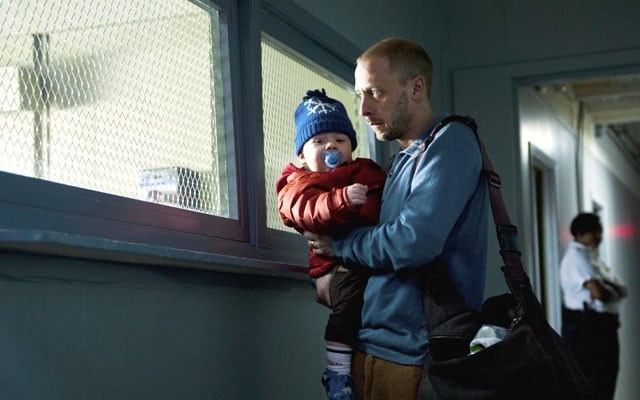The Husband, by Canadian director Bruce McDonald, won the $15,000 first prize in Borsos Competition for Best Canadian Feature Film at the Whistler Film Festival (WFF) last week.
It took one of 17 prizes at an awards breakfast at the Whistler Conference Centre on Dec. 8, the festival's final day.
This film shows the other side of an adulterous affair, following Henry (Maxwell McCabe-Lokos) as he deals with raising a child while his wife serves a prison sentence for an affair with a 14-year-old student.
"I'm really happy. Bruce McDonald is a dear friend of the festival. He been here several times and he's done several films as a result of coming here and connecting with the people he's met here," said Shauna Hardy Mishaw, executive director of the festival.
The competition is the second largest festival prize for a Canadian film in the country, and is in its 10th year.
Tatiana Maslany won WFF's Best Performance in a Borsos Competition Film Award for the second year in a row, for her role in Cas & Dylan.
Cas & Dylan also won the WFF Audience Award. Along with Maslany, the film also stars Oscar-winner Richard Dreyfuss and is Canadian filmmaker and actor Jason Priestley's directorial debut.
Hardy Mishaw said: "I'm also very happy that Cas & Dylan won our audience award. It was turned down at TIFF, I'm not sure of the reason. It was extremely well received here and got a huge amount of press. And for Tatiana Maslany to win best performance for the second year in a row... that to me is the cherry on top."
The audience award runner-up was The Grand Seduction.
Jennifer Merin of the New York-based Alliance of Women Film Journalists presented two of their annual EDA awards for women filmmakers, telling the audience that it was their organization's first partnership with a Canadian festival.
The award for Best Female-Directed Documentary went to Lucy Walker and her Oscar-nominated story of the accident and recovery of half-pipe snowboarder Kevin Pearce, The Crash Reel. The film closed the festival on Sunday night.
The Crash Reel also won a second award, The WFF Best Mountain Culture Film Award.
The EDA jury awarded a special mention in the documentary category. This went to Canadian director Alanis Obomsawin for her Hi-Ho Mistahey!, the story of Shannen Koostachin, a Cree teenager from Attawapiskat, Ontario, and her efforts to lobby for improved educational opportunities for First Nations youth.
"The journey is very long for the rights of indigenous children," Obomsawin said when tearfully accepting her honour.
The EDA's Best Female-Directed Narrative Feature winner was Toronto's Ingrid Veringer for The Animal Project.
When she accepted her award, Veringer told the audience about a new writing program for Canadian female screenwriters and directors that her production company pUNK Films is starting in January.
She challenged the audience to help her make it happen by donating $6,000 to the program.
"I know this is a ballsy request, but I would like to see more feature films made by women! Who can donate $6,000 for six features?" Veringer asked the audience.
"I'll do it!" called out Oscar winning actress Melissa Leo, this year's WFF Luminary, who jumped out of her chair. There was loud applause.
Winner of the MPPIA Short Film Award, taking home a cash prize of $15,000 and $100,000 of in-kind production services was Nick Citton for The Future Perfect.
The WFF World Documentary Award was awarded to Jingle Bell Rocks!, directed by Mitchell Kezin.
The $1,000 Canadian ShortWork Award went to Anxious Oswald Greene, directed by Marshall Axani. The Jury commented: "The time and attention that was put into every facet of this film from writing to the art direction to the editing demonstrates an inventive directorial vision."
The International ShortWork Award went to A Grand Canal, directed by Johnny Ma. Ma told the audience that his mother would ask him if he won a prize every time he went to a film festival and he was very happy to finally be able to tell her he had.
The $500 ShortWork Student Award presented by Capilano University Film Centre went to Backward Fall by Andrew Pollins of the University of British Columbia.
Steven Gaydos, the executive editor of Variety magazine acknowledged Variety's 10 Screenwriters to Watch, seven of whom were present at the festival. They were Ned Benson (The Disappearance of Eleanor Rigby); Lucinda Coxon (Crimson Peak); Andrew Dodge (Bad Words); Kieran Fitzgerald (Bambi); Morgan David Foehl (The Asset); Jennifer Lee (Frozen); Barbara Marshall (The Exorcism Diaries); Michael Mitnick (The Giver); Jonathan Tropper (One Last Thing Before I Go); and Canadian screenwriter Elan Mastai (The F Word).
Gaydos has watched the festival grow over the last five years. Variety started bringing its 10 Screenwriters to Watch discussion to the festival in 2012, and he acted as "In Conversation" interviewer for the festival this year, talking to actors Richard Dreyfuss and Melissa Leo.
Gaydos said: "A festival like Whistler gives you an alternative in dozens of movies you'd never see another way, so it's great for the local community... we're still building a bridge between Hollywood and Whistler... I am determined to build that platform for the awards season here and build that bridge between Hollywood and Canada."




